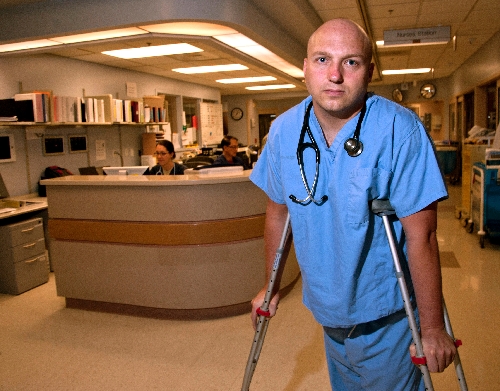Nellis doctor describes aiding would-be rescuer

The Nellis Air Force Base doctor who broke his leg and then played a crucial role in saving a California Highway Patrol officer struck by a helicopter blade in a backcountry rescue attempt said Wednesday his battlefield training got him through the ordeal.
“I’ve never been deployed, but in the Air Force we train for this stuff constantly,” Maj. Jeremy Kilburn said, reflecting on the near-tragedy that evolved last week while hiking with his friend, Dan Grasso, in a remote area of Shasta-Trinity National Forest.
Kilburn is 99th Medical Operations Squadron Cardio/Pulmonary Flight commander and director of the Intensive Care Unit at the Nellis base medical center.
He and Grasso were trying to get away from the Fourth of July weekend crowds for a hike over the holiday and selected picturesque Bear Lake in Northern California for their destination.
But during the hike, Kilburn’s 2-year-old German shepherd, Virgil, nudged him on the rocky trail, causing Kilburn to fall, breaking his leg.
Counselors with a satellite phone at nearby Camp Unalayee summoned a California Highway Patrol helicopter to extract Kilburn.
But when the helicopter arrived and landed in a V-shaped rock formation, officer Tony Stanley tried to reach Kilburn but first had to duck under the whirling rotor blades.
Said Grasso: “I started walking toward Jeremy and heard this horrible thud. I knew what happened, that he (Stanley) must have been hit by the blade. This was a very critical situation. He had to get medical attention right away.”
Kilburn, 34, who was sitting on a rock about 50 yards away said he “could tell something horrible had gone wrong.”
“Everything changed in the blink of an eye. I just was very scared for this guy’s life,” Kilburn said.
Then teamwork kicked in.
Bryce Harbert, 20, a camp counselor from Santa Cruz, Calif., reached the stricken CHP officer and administered first aid.
Grasso went to help Kilburn hobble to the scene.
“I tripped and fell a couple times and crawled a little bit. It was one of those moments out the movie. My brain was on fire,” he said describing how adrenaline rushed through his body as he struggled to reach Stanley. “There was so much adrenaline flowing, I literally forgot about my leg.”
Once they reached Stanley, he used an emergency medical kit from the helicopter to insert a tube into Stanley’s trachea to keep him breathing, while Harbert applied pressure to keep the officer’s fractured skull from bleeding too much.
Grasso, also 34, said, “It was pretty amazing to watch. I was very impressed with the way Jeremy handled himself.”
When Stanley regained consciousness, he was breathing and coughing and moving his eyes, Kilburn said.
After a while he made a decision to load him on the helicopter for the flight to a hospital in Redding, Calif.
Kilburn and camp counselor Elizabeth Fitch climbed on board. Fitch, 26, kept pressure applied to Stanley’s skull while Kilburn used a tightly sealed mask, ventilation device and oxygen on board to keep Stanley breathing.
“There’s guys in Afghanistan with both legs blown off and these guys live. We’ve just got to think about what needs to be done,” Kilburn said.
During the flight, Stanley became alert. “At least two or three times he gave us thumbs up,” Kilburn said.
When they arrived in Redding, they were greeted by a throng of emergency hospital personnel, who rushed Stanley to a trauma unit.
Although his condition was unknown, he was expected to recover, Kilburn said. “There’s no way I could have done this without Bryce and Beth and Dan. The officer would have been done.”
Kilburn felt guilty that Stanley was severely injured while trying to rescue him.
“If I was in his situation, he would run down with two broke legs to save me,” he said.
He hopes to visit Stanley after he recovers.
“I want to give him a hug and say, ‘How you doing buddy?’ I just want to thank him so much for him coming to the rescue for me, to risk his life.”
Contact reporter Keith Rogers at
krogers@reviewjournal.com or 702-383-0308.












